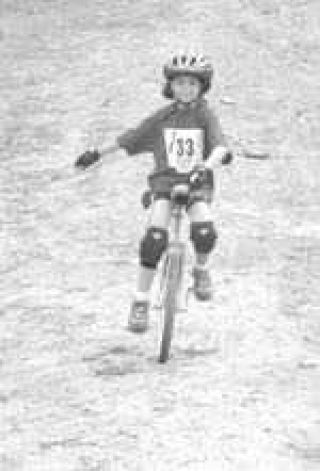Sixteen members of the Panther Pride Demo Team recently returned from the National Unicycling Convention (NUC) in Toronto, Canada, where they competed against 19 other teams and 272 other athletes from the United States, Canada and Puerto Rico, winning 214 medals in seven days.
Panther Pride Coach Alan Tepper was pumped about his teams’ overall efforts, and is looking forward to this fall when they resume practice at North Bend Elementary School where he is a physical education teacher.
“They did great. I am just really proud of them. They competed well, with dignity and pride, and did the best that they could,” Tepper said.
He wanted to stress that the event is not just cut-throat competition. Workshops, sharing of skills and teaching among competitors also takes place during the summer event.
“They were respectful of all the other riders that were there. We had a lot of fun,” Tepper said.
Competition was divided into three categories – artistic, track and field and mountain biking. The Panther Pride brought home 164 medals in the track and field events, 33 medals in the artistic events and 17 medals in the mountain biking events.
Artistic events include the parade competition, as groups, pairs or individuals. It consisted of a pre-determined routine, which was judged half on skill difficulty and half on presentation, including music, costuming and choreography categories. There was also the compulsory event. It entailed the construction of the individualOs own routine and encompassed riding, stationary skills, balance transition and mounting and dismounting.
The routine had to be sent to the head judge of the competition three to six weeks in advance. It was entered into a computer, which compiled the variables and gave out a base score for the routine. The computer then divided all competitors into groups according to the scores, so that they would be competing against others of their own skill level.
At the competition, riders had three minutes to perform their routine, exactly as written, as there were major deductions if the routines were performed differently than what was originally submitted to the judge. Scoring was determined by a point system that is totaled by taking the base score and subtracting missed points.
Another event in which the team won awards was the national age group championship, which they won for the second time in a row because of their numerous age group awards and records.
Track and field competition included everything that would normally be done on foot, except pole vaulting – plus a few more tricks. The long and high jumps, relays, sprints and distance events are commonplace. But unicyclers also competed in the 50-meter backwards race and a 30-meter wheel walk, where cyclists push the top of the tire with their feet, rather than using the petals to push them forward.
The mountain biking section involved four types of competition. The downhill course measures speed, the uphill course requires a unicycler to turn sideways and hop or “tack” back and forth in a weaving pattern to make it up a hill, the cross-country course incorporates naturally-occurring up and down trails and the mountain marathon events range in length from a 10K to an actual 26.2 mile marathon distance.
There was also a non-competitive trials portion in the contest that used obstacles throughout various circuit stations. Some of the objects they manipulated were giant wire spools, cars, beams and logs – all in the name of getting on top of them and back down again without the contestants letting their feet touch the ground.
Tepper sees the NUC as a way to not only showcase skills, but to create camaraderie between teams.
His team befriended a team from Puerto Rico, with whom they traded team shirts.
“Its a great way for all the riders to really learn lots of different things, and it has proven extremely successful. “They learn new skills and renew their excitement and motivation to compete,” Tepper said.
Tepper said they come back pumped up and the rest of the team who didn’t go, are affected by their experiences.
“It’s a positive trickle-down effect,” Tepper said. “Everybody’s learning curve goes through the ceiling because they try with a different sense of purpose – working with older and those of the same skill level, which is the intent of the national unicyling convention.”
Tepper’s team will host the National and World Championships back-to-back in July and Aug. of next year. The 1999 national event was also held here, with the mountain biking competiton held at Snoqualmie Pass and other events held at Mount Si High School.
Because of a lack of hotels in the Snoqualmie N North Bend area, Tepper is looking for people who are willing to host athletes during the national and world competitions.
If interested, call him at North Bend Elementary School, (425) 831-8384. Translators are also needed for the event to help with translating, as well as preparing written information for the athletes. Some of the languages they will need help with are Chinese, Japanese, German, Pakistani, Finnish, Swedish, Spanish, Italian and French.



